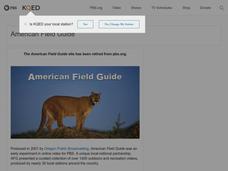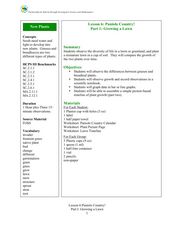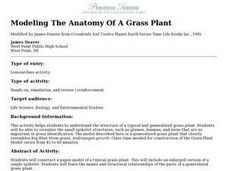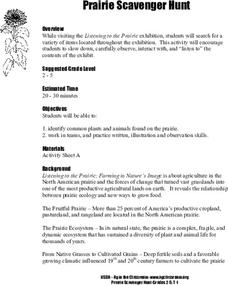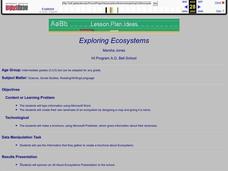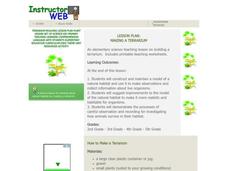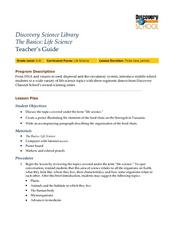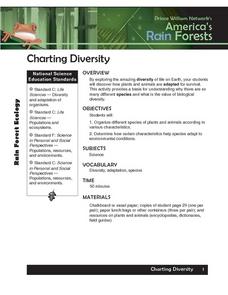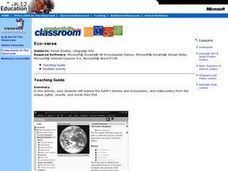Curated OER
The Formation and Value of Temperate Grasslands
Students get an overview of the climate and organisms of the North American Prairie. After a lecture, and watching some videos imbedded in this plan, students compile research data on the North American Prairie.
Curated OER
Prairie Scavenger Hunt
Middle schoolers take a close look at the prairie environment. They identify common plants and animals of the prairie. In addition, pupils work in teams in order to put together a presentation on a certain aspect of the prairie...
Curated OER
Where's the Grass
Students participate in a grassland game. In this grassland lesson, students simulate the impact of grazing animals and invasive weeds on grasslands.
Curated OER
Growing a Lawn
Students research plant growth. In this plant growth lesson, students explore the needs of plants. Students compare and contrast grass and broadleaf plants and grow a miniature lawn in a cup of soil. Resources are provided.
Curated OER
Animals Around Us
Students view and discuss a Discovery Channel video that compares the animals found in four different habitats. They compare and contrast the characteristics of forests, deserts, wetlands and grasslands then choose one to depict in a...
University of Georgia
Land Biomes Project
Challenge scholars to research a biome and create a presentation for the producers of Survivor to choose their ecosystem for the next season's show. The materials include outlines, worksheets, and grading rubrics for individuals as well...
Curated OER
A Growing Success
Students create a multimedia presentation as a culmination of a plant unit. In this hyperstudio lesson, students research from assigned sites and create a Hyperstudio stack. Students write a cinquain.
Curated OER
Habitat Mural
Young scholars build a collage of an ecosystem. The goal is for them to understand interactions in a community, plant and animal adaptations, and how all life depends on plants. This activity is based on Wump World and students describe...
Curated OER
Ecosystems Online
Students work together to gather information on ecosystems from websites. They identify plants and animals and create their own website. They are graded on their willingness to work together and the content on the website.
Curated OER
Modeling The Anatomy Of A Grass Plant
High schoolers explore the structure of a typical and generalized grass plant. They visualize the structures of a grass plant by constructing a paper model. In addition, they identify the names and structural relationships of the parts...
Curated OER
Praire Biome Models
Fifth graders, in groups, list the physical characteristics of a biome and think of ways in which animals might have to adapt to live there and make a biome mobile ball that show the different types of habitats that shape the praire biome.
National Wildlife Federation
What's Your Habitat?
How are third graders like rabbits? They both live in habitats and require food, water, and shelter to survive! An educational science lesson encourages your learners to think about their own habitats and survival needs, before comparing...
Curated OER
Prairie Scavenger Hunt
Students search for a variety of items while visiting a Listening to the Prarie exhibition.
Curated OER
Exploring Ecosystems
Students examine the characteristics of an ecosystem. They create their own landmass of an ecosystem and creating a map of the area. They develop a brochure sharing information about their new landmass.
Curated OER
Biomes of the World (and Canada)
Young scholars explore environments by analyzing food chains. In this biome identification lesson, students define a list of environmental vocabulary terms such as tundra, rain-forest and desert. Young scholars create a fictional self...
Curated OER
Making a Terrarium
Students construct and maintain model of natural habitat, suggest improvements to the model of the natural habitat to make it more realistic and habitable, and demonstrate careful observation and recording of how animals survive in their...
Curated OER
Marine & Aquatic Habitats Activities - Terrestrial Forests vs. Kelp Forests
Middle schoolers discuss concept and specificity of habitats, both marine and terrestrial, list similarities and differences in the habitats of a kelp forest and a terrestrial forest, compare types of organisms that occupy corresponding...
Curated OER
Natural Features of Our Community
Second graders read about and discuss natural features of communities. They listen to a guest speaker, such as a park ranger to expand their knowledge of natural features. They go on a field trip, if possible, to a local zoo or...
Curated OER
In The Zone
Third graders identify ways that ocean animals grow, survive, reproduce, and adapt. They use computer Internet skills to acces and collect information. They create a PowerPoint presentation. They demonstrate writing skills throughthe...
Curated OER
The Basics: Life Science
Students develop an understanding of the different fields of study that are encompassed by the term, life science. They view and discuss a video on the topic. In small groups they focus on on of the examples shown in the video to create...
Curated OER
Charting Diversity
Students organize different species of plans and animals according to various characteristics. Students then determine what characteristics enable them to survive in their habitat. Game ideas and activities are included.
Curated OER
Land Associations
Middle schoolers identify and explore life forms of various biomes, define transitional regions, examine effects of abiotic and biotic interactions, research a biome, and produce newspaper that features environmental information. Lessons...
Curated OER
Utah's Biomes
Fourth graders discover what a biome is and study biomes that are native to Utah in this series of lessons. They examine how Utah's biomes have changed over time due to the influence of the Mormon pioneers and other human populations.
Curated OER
Eco-Poetry
Students explore the Earth's various biomes and ecosystems using Internet research. They create a multimedia poem using the photos, sounds, and vocabulary from their research.
